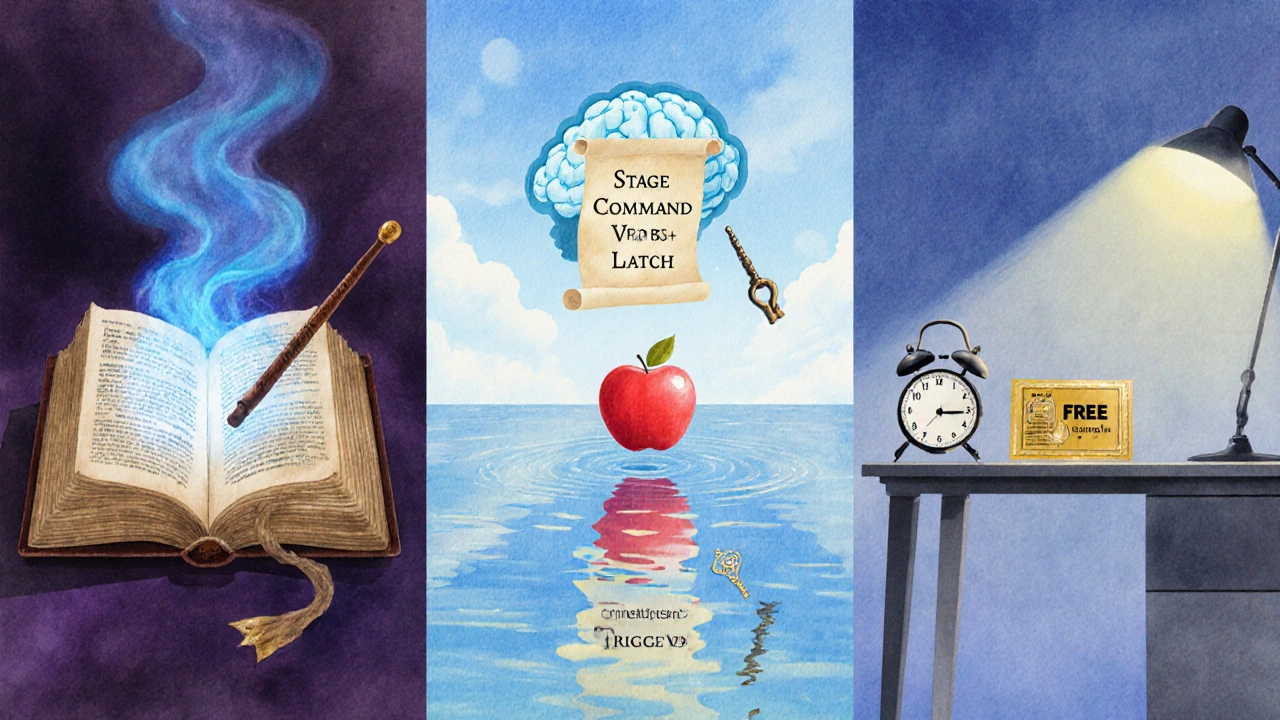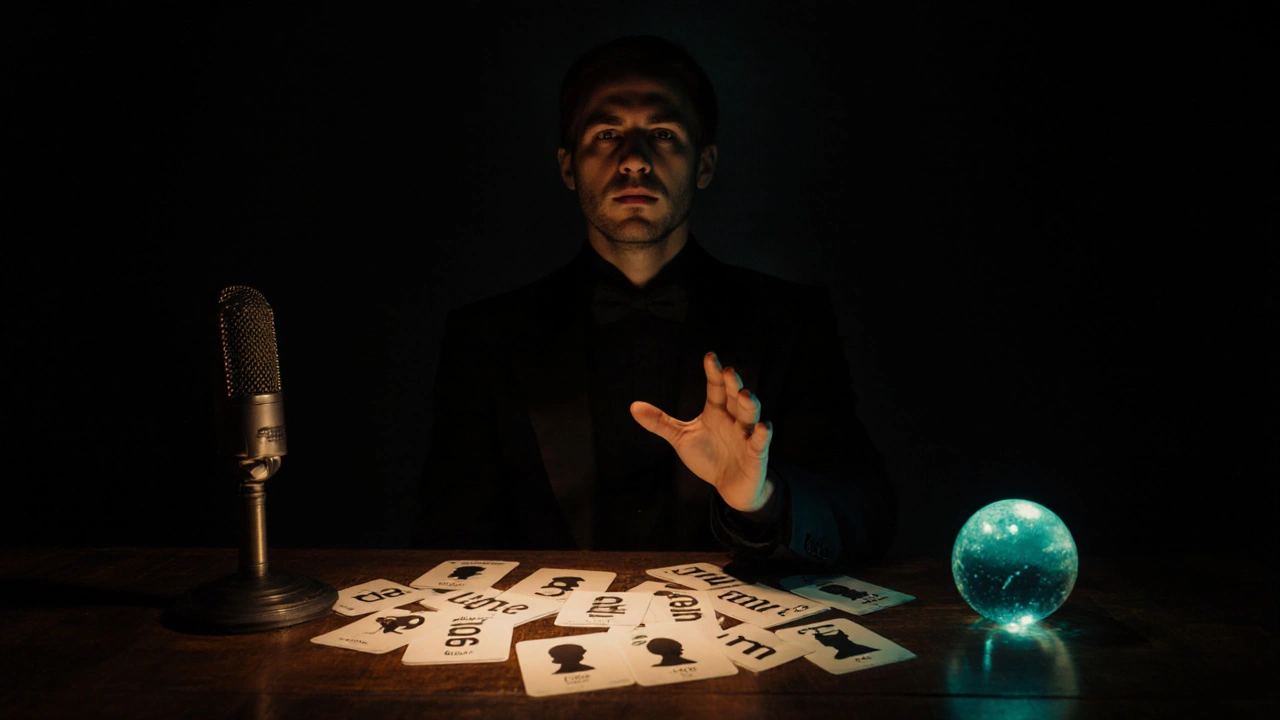Magic Word Categorization Quiz
Test Your Magic Word Knowledge
Match each magic word to its correct category. How many can you get right?
When a performer says a single phrase that makes the audience gasp, they’re using magic words a set of carefully chosen words that create a sense of wonder, focus attention, or subtly influence perception. Whether you’re on a stage, at a dinner table, or writing a sales email, knowing the right words can turn a simple trick into a memorable experience. Below you’ll find the full list of 100 magic words, grouped by their typical use, plus practical tips on how to weave them into your act.
Why "magic words" matter to a performer
Every magician relies on three core principles: misdirection, suggestion, and storytelling. Misdirection the art of directing the audience’s attention away from the method is amplified when a word cues the shift. Suggestion subtle mental nudges that shape what the audience believes works best with familiar or emotionally charged language. And a strong narrative needs words that paint vivid pictures. Mastering the right vocabulary helps you control the flow without obvious force.
How the 100 words are organized
We’ve divided the list into four categories that reflect where you’ll most often hear them:
- Classic incantations - timeless phrases that sound mystical.
- Stage‑command verbs - action words that cue the audience to look, listen, or react.
- Mentalism triggers - subtle prompts that plant ideas.
- Everyday persuasive words - language that works in sales, coaching, or casual conversation.
| Category | Typical Use | Key Effect |
|---|---|---|
| Classic incantations | Opening or closing a routine | Creates atmosphere |
| Stage‑command verbs | Directing focus | Sharpens attention |
| Mentalism triggers | Planting ideas | Guides choice |
| Everyday persuasive words | Outside‑the‑box influence | Builds rapport |
1. Classic incantations (30 words)
These are the phrases you hear in movies and on stage that instantly signal "something magical is happening." Use them at the start of a trick or as a climax to heighten drama.
- Abracadabra
- Alakazam
- Presto
- Shazam
- Hocus Pocus
- Open Sesame
- Sim Sala Bim
- Expecto Patronum
- By the Power of Grayskull
- Wingardium Leviosa
- Zoop
- Plop
- Kazoo
- Veni Vidi Vici
- Alakazaam
- Gadzooks
- Shiver Me Timbers
- Oomph
- Ta-da
- Voila
- Voilá
- Shazam
- Snap!
- Bibbidi‑Bobbidi‑Boom
- Sesame
- Muk‑Mook
- Bazinga
- Zing
- Kazam
- Poof

2. Stage‑command verbs (25 words)
These verbs act like triggers. When you say them, the audience instinctively looks or listens. Pair them with a gesture for maximum impact.
- Watch
- Listen
- Focus
- Notice
- Observe
- Look
- See
- Feel
- Remember
- Imagine
- Believe
- Think
- Hold
- Choose
- Pick
- Take
- Count
- Remember
- Notice
- React
- Pause
- Now
- Again
- Again
- Finally
3. Mentalism triggers (20 words)
These words plant an idea without the audience realizing it. Use them in a calm, off‑hand tone so they feel natural.
- Imagine a red apple
- Think of a number between 1 and 10
- Remember the word "forest"
- Picture a blue sky
- Feel the temperature rise
- Consider the scent of coffee
- Recall a time you felt joy
- Notice the word "silence"
- Envision a key
- Hear the sound of water
- Think of a movie title
- Imagine a glowing object
- Feel the weight of a coin
- Recall the phrase "once upon a time"
- Picture a door that opens
- Sense the texture of silk
- Think of a bird in flight
- Remember the sound of laughter
- Imagine a blank page
- Feel a warmth spreading
4. Everyday persuasive words (25 words)
Outside of performance, these words influence decisions in sales, coaching, or everyday conversation. They’re the “secret sauce” for any persuasive talk.
- Because
- Free
- New
- Limited
- Proven
- Instant
- Easy
- Secret
- Guarantee
- Now
- You
- Imagine
- Results
- Better
- Save
- Discover
- Expert
- Simple
- Exclusive
- Best
- Limited‑time
- Act
- Join
- Start
- Now
How to embed the words into a routine
Throwing the list at your audience won’t work. Here’s a quick checklist to make each word count:
- Pick a word that matches the mood of the trick. A solemn incantation works better for a reveal than a goofy "Poof".
- Pair the word with a physical cue. Say "Watch" while moving a card into view.
- Keep the phrasing short. A two‑second pause before the word builds anticipation.
- Use tonal variation. Raise your voice slightly on "Abracadabra" to signal a climax.
- Reinforce the word with a story. Explain why the word matters, even if it’s a fake mythology.

Common pitfalls and how to avoid them
Even seasoned magicians slip up with language. Spot the traps early:
- Over‑use: Repeating the same incantation in every routine makes it lose impact. Rotate between the 30 classic phrases.
- Incongruent tone: Saying "Free" during a serious mind‑reading act feels out of place. Match the word’s vibe to the routine’s theme.
- Too fast: Dropping a command verb without a pause can confuse the audience. A half‑second gap lets the brain register the cue.
- Unnatural delivery: Reading the list verbatim sounds rehearsed. Embed the word into casual speech.
Practice routine (8‑minute drill)
Run this drill weekly to make the vocabulary second nature:
- Choose five words from each category.
- Build a 2‑minute mini‑act that uses one word from each list.
- Record yourself, focusing on timing and tone.
- Watch the playback and note moments where the audience’s reaction spikes.
- Adjust the phrasing, then repeat.
After a few weeks you’ll instinctively know which word to pull for any situation.
Takeaway
The power of magic words isn’t in the letters themselves; it’s in the psychological cue they create. By learning the 100 most effective words and practicing the delivery tips above, you’ll add a hidden lever to every performance.
Frequently Asked Questions
Can I use these words in a non‑magic context?
Absolutely. The everyday persuasive words (like "because" or "free") are proven to boost conversions in sales copy, coaching, and even everyday conversation.
Do the classic incantations work with modern audiences?
Yes, but only when you give them fresh context. Pair "Abracadabra" with a new visual effect or a funny back‑story to keep it from feeling cheesy.
How many words should I sprinkle into a single trick?
One to three is ideal. Too many cues can overwhelm the audience and dilute the effect.
Are there cultural considerations when using certain words?
Definitely. Some incantations like "Open Sesame" have roots in Middle Eastern folklore and may resonate differently across regions. Test on a small audience first.
What’s the best way to memorize the full list?
Break the list into the four categories, use flashcards, and associate each word with a vivid mental image. Repetition during practice routines cements them.

